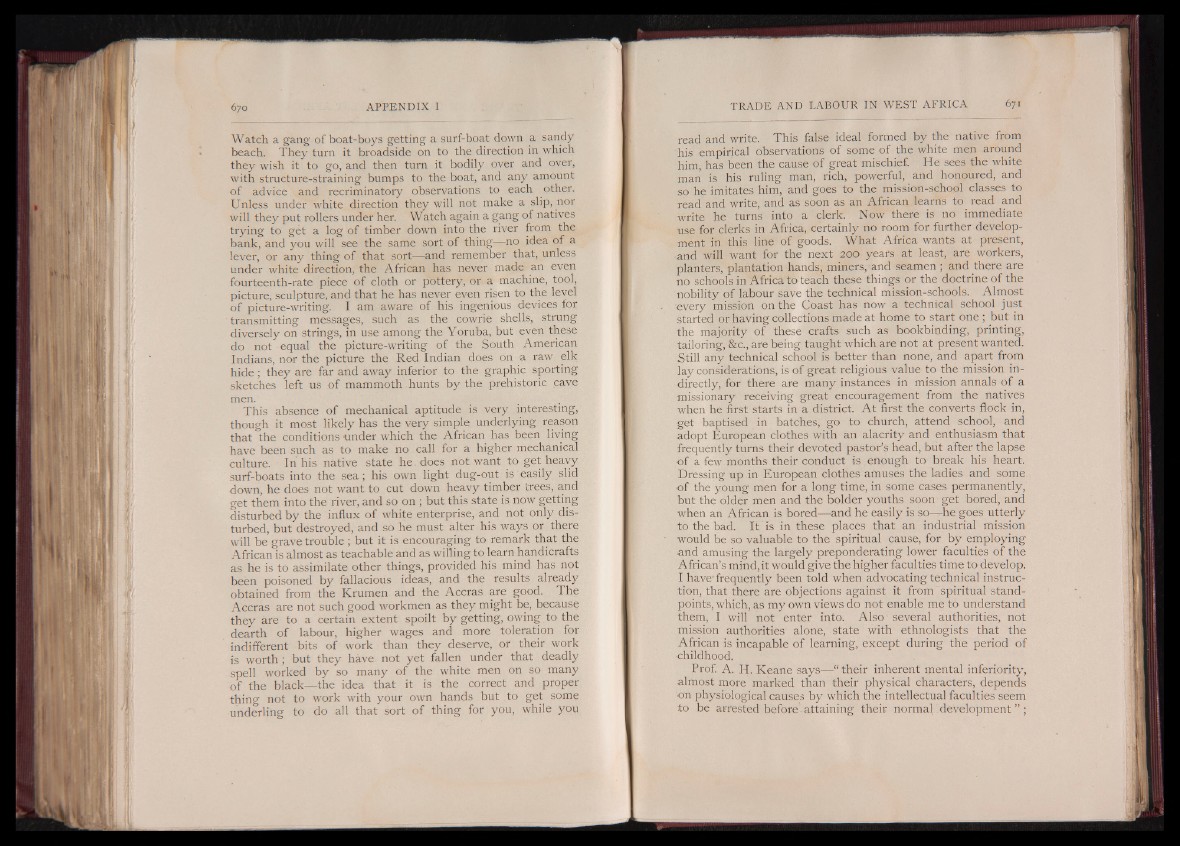
Watch a gang of boat-boys getting a surf-boat down a sandy
beach. They turn it broadside on to the direction in which
they wish it to go, and then turn it bodily over and over,
with structure-straining bumps to the boat, and any amount
o f advice and recriminatory observations to each other.
Unless under white direction they will not make a slip, nor
will they put rollers under her. Watch again a gang of natives
trying to get a log of timber down into the river from the
bank, and you will see the same sort of thing— no idea of a
lever, or any thing o f that sort— and remember that, unless
under white direction, the African has never made an even
fourteenth-rate piece of cloth or pottery, or a machine, tool,
picture, sculpture, and that he has never even risen to the level
o f picture-writing. I am aware of his ingenious devices for
transmitting messages, such as the cowrie shells, strung
diversely on strings, in use among the Yoruba, but even these
do not equal the picture-writing of the South American
Indians, nor the picture the Red Indian does on a raw elk
h ide ; they are far and away inferior to the graphic sporting
sketches left us o f mammoth hunts by the prehistoric cave
men.
This absence of mechanical aptitude is very interesting,
though it most likely has the very simple underlying reason
that the conditions -under which the African has been living
have been such as to make no call for a higher mechanical
culture. In his native state he . does not want to get heavy
surf-boats into the s e a ; his own light dug-out i s ' easily slid
down, he does not want to cut down heavy timber trees, and
get them into the river, and so on ; but this state is now getting
disturbed by the influx o f white enterprise, and not only disturbed,
but destroyed, and so he must alter his ways or there
will be grave trouble; but it is encouraging to remark that the
African is almost as teachable and as willing to learn handicrafts
as he is to assimilate other things, provided his mind has not
been poisoned by fallacious ideas, and the results already
obtained from the Krumen and the Accras are good. The
Accras are not such good workmen as they might be, because
they are to a certain extent spoilt by getting, owing to the
dearth o f labour, higher wages and more toleration for
indifferent bits of work than they deserve, or their work
is w o rth ; but they have not yet fallen under that deadly
spell worked by so many of the white men on so many
o f the black— the idea that it is the correct and proper
thing not to work with your own hands but to get some
underling to do all that sort o f thing for you, while you
read and write. This false ideal formed by the native from
his empirical observations of some of the white men around
him, has been the cause of great mischief. He sees the white
man is his ruling man, rich, powerful, and honoured, and
so he imitates him, and goes to the mission-school classes to
read and write, and as soon as an African learns to read and
write he turns into a clerk. Now there is no immediate
use for clerks in Africa, certainly no room for further development
in this line of goods. What Africa wants at present,
-and will want for the next 200 years at least, are workers,
planters, plantation hands, miners, and seamen ; and there are
no schools in Africa to teach these things or the doctrine of the
nobility of labour save the technical mission-schools. Almost
every mission on the Coast has now a technical school just
started or having collections made at home to start one ; but in
the majority of these crafts such as bookbinding, printing,
tailoring, &c., are being taught which are not at present wanted.
Still any technical school is better than none, and apart from
lay considerations, is of great religious value to the mission indirectly,
for there are many instances in mission annals of a
missionary receiving great encouragement from the natives
when he first starts in a district. A t first the converts flock in,
get baptised in batches, go to church, attend school, and
adopt European clothes with an alacrity and enthusiasm that
frequently turns their devoted pastor’s head, but after the lapse
o f a few months their conduct is enough to break his heart.
Dressing up in European clothes amuses the ladies and some
of the young men for a long time, in some cases permanently,
but the older men and the bolder youths soon get bored, and
when an African is bored— and he easily is so— he goes utterly
to the bad. It is in these places that an industrial mission
would be so valuable to the spiritual cause, for by employing
and amusing the largely preponderating lower faculties of the
African’s mind, it would give the higher faculties time to develop.
I have' frequently been told when advocating technical instruction,
that there are objections against it from spiritual standpoints,
which, as my own views do not enable me to understand
them, I will not enter into. Also several authorities, not
mission authorities alone, state with ethnologists that the
African is incapable of learning, except during the period of
■childhood.
Prof. A. H. Keane says— “ their inherent mental inferiority,
almost more marked than their physical characters, depends
on physiological causes by which the intellectual faculties seem
to be arrested before , attaining their normal development ” ;